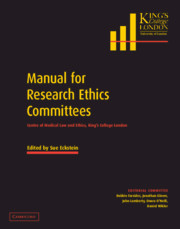Book contents
- Frontmatter
- Contents
- Editorial board
- Acknowledgements
- List of contributors
- Introduction
- Part I
- 1 The ethics of clinical research
- 2 Research ethics committees and the law
- 3 The regulation of medical research: a historical overview
- 4 The regulation of medical research in the UK
- 5 Observational and epidemiological research
- 6 Social survey research
- 7 Approaching qualitative research
- 8 Complementary and alternative medicine: challenges for research ethics committees
- 9 The ethical review of student research in the context of the governance arrangements for research ethics committees
- 10 The ethics of genetic research
- 11 Research or audit?
- 12 Randomised controlled trials
- 13 Determining the study size
- 14 Risk assessment for research participants
- 15 Absorbed radiation in patient and volunteer studies submitted to the ethical committee: a memorandum
- 16 A guide to the use of radioactive materials and radiological procedures for research purposes
- 17 Indemnity in medical research
- 18 The prevention and management of fraud and misconduct: the role of the LREC
- 19 Understanding clinical trials: a model for providing information to potential participants
- 20 The law relating to consent
- 21 Writing information for potential research participants
- 22 The law relating to confidentiality
- 23 Research involving vulnerable participants: some ethical issues
- 24 The ethics of research related to healthcare in developing countries
- Part II
- Index
4 - The regulation of medical research in the UK
Published online by Cambridge University Press: 08 January 2010
- Frontmatter
- Contents
- Editorial board
- Acknowledgements
- List of contributors
- Introduction
- Part I
- 1 The ethics of clinical research
- 2 Research ethics committees and the law
- 3 The regulation of medical research: a historical overview
- 4 The regulation of medical research in the UK
- 5 Observational and epidemiological research
- 6 Social survey research
- 7 Approaching qualitative research
- 8 Complementary and alternative medicine: challenges for research ethics committees
- 9 The ethical review of student research in the context of the governance arrangements for research ethics committees
- 10 The ethics of genetic research
- 11 Research or audit?
- 12 Randomised controlled trials
- 13 Determining the study size
- 14 Risk assessment for research participants
- 15 Absorbed radiation in patient and volunteer studies submitted to the ethical committee: a memorandum
- 16 A guide to the use of radioactive materials and radiological procedures for research purposes
- 17 Indemnity in medical research
- 18 The prevention and management of fraud and misconduct: the role of the LREC
- 19 Understanding clinical trials: a model for providing information to potential participants
- 20 The law relating to consent
- 21 Writing information for potential research participants
- 22 The law relating to confidentiality
- 23 Research involving vulnerable participants: some ethical issues
- 24 The ethics of research related to healthcare in developing countries
- Part II
- Index
Summary
Regulatory responsibilities
Clinical research is controlled in the UK, in Europe and in most of the world by three different and parallel systems:
Legislation: a matter of what the law requires in terms of actions and responsibilities. The first European Directive intended to address the subject of Good Clinical Practice was 91/507/EEC. The European Commission has recently reported that a second directive, the Directive on GCP in Clinical Trials, has been adopted. It was signed off by the European Parliament and Council on 4 April 2001.
Regulatory or competent authority overview: the issue of licences to conduct research, manufacture products and market medicines for human use. This also involves the supervision of compliance with legal standards and accepted guidelines and the provision of expert ongoing safety review.
Ethics committee activities: providing pre-study opinion, ongoing review, safety review, termination reports and acting as an independent referee on behalf of the subject and society.
Legislation: history
The process of regulation in most areas began with international codes of practice such as the Nuremberg Code, the Declaration of Helsinki (original version 1964) and national guidelines for the conduct of clinical trials, which subsequently evolved into legislation.
In terms of legislation the United States took the lead with a series of measures through the 1960s to 1980s which evolved into the Code of Regulations of the Food and Drug Administration 21 CFR. Individual European national governments together with the European Community then produced their own legislation.
- Type
- Chapter
- Information
- Manual for Research Ethics CommitteesCentre of Medical Law and Ethics, King's College London, pp. 23 - 33Publisher: Cambridge University PressPrint publication year: 2003

